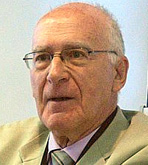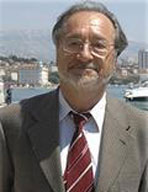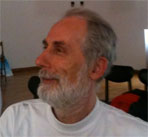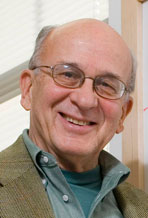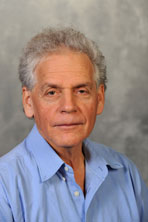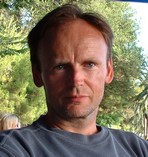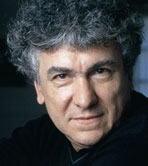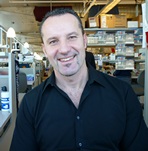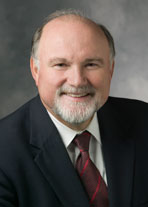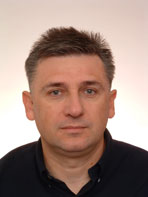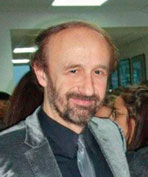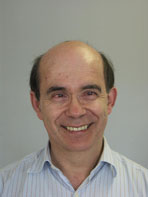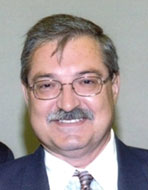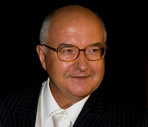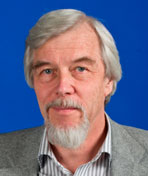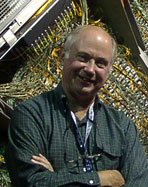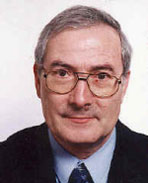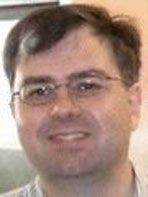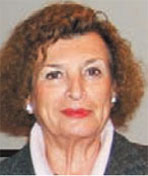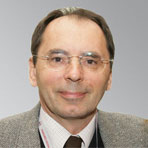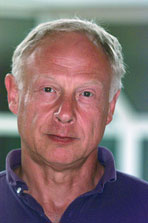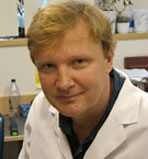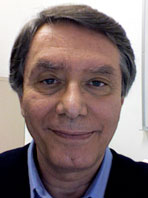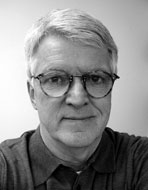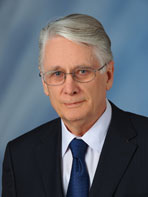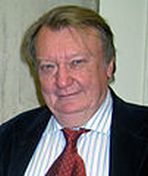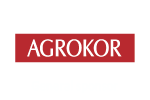Daniel Denegri
Profesor Denegri is one of the leading Croatian physicists. For the past 20 years, he has worked at the European Center for Nuclear Research (CERN) and is a world-renowned scientist in the field of particle physics. He completed elementary and secondary schooling in Split, and is a graduate of the Faculty of Science, University of Zagreb. During his doctoral studies at Johns Hopkins University, Baltimore, USA, he became totally immersed in particle physics. Following the defense of his doctoral dissertation and postdoctoral training, he transferred to the Department of Particle Physics at the CEA Saclay Centre in France, where he is closely associated with CERN.
Profesor Denegri is one of the leading Croatian physicists. For the past 20 years, he has worked at the European Center for Nuclear Research (CERN) and is a world-renowned scientist in the field of particle physics. He completed elementary and secondary schooling in Split, and is a graduate of the Faculty of Science, University of Zagreb. During his doctoral studies at Johns Hopkins University, Baltimore, USA, he became totally immersed in particle physics. Following the defense of his doctoral dissertation and postdoctoral training, he transferred to the Department of Particle Physics at the CEA Saclay Centre in France, where he is closely associated with CERN.
Goran Senjanović
Prof. Goran Senjanovic is a senior research scientist at the International Center for Theoretical Physics in Trieste. Before joining ICTP, he has worked for years at the Brookhaven National Laboratory and was briefly a professor of physics at the Univ. of Zagreb. He is a leading figure in theoretical high energy physics beyond the standard theory of elementary particles and their forces. Senjanovic is the co-inventor of the "seesaw" explanation for the smallness of neutrino mass, and is well known for his pioneering work on Left-Right symmetric models. His papers on this subject are considered a milestone, having achieved thousands of citations. Among a number of important ideas in his more than 100 scientific papers, he has predicted supersymmetric unification of forces in nature and suggested the way for observing electron number violation at colliders, today a paradigm for such processes at the Large Hadron Collider at CERN. He is also a prominent figure in the field of Grand Unified Theories, and has served as its spokesperson over the years.
Prof. Goran Senjanovic is a senior research scientist at the International Center for Theoretical Physics in Trieste. Before joining ICTP, he has worked for years at the Brookhaven National Laboratory and was briefly a professor of physics at the Univ. of Zagreb. He is a leading figure in theoretical high energy physics beyond the standard theory of elementary particles and their forces. Senjanovic is the co-inventor of the "seesaw" explanation for the smallness of neutrino mass, and is well known for his pioneering work on Left-Right symmetric models. His papers on this subject are considered a milestone, having achieved thousands of citations. Among a number of important ideas in his more than 100 scientific papers, he has predicted supersymmetric unification of forces in nature and suggested the way for observing electron number violation at colliders, today a paradigm for such processes at the Large Hadron Collider at CERN. He is also a prominent figure in the field of Grand Unified Theories, and has served as its spokesperson over the years.
Paško Rakić
Dr. Paško Rakić is Professor and Chairman of Neurobiology Department and director of Kavli Institute for Neuroscience at Yale University, USA. His research interests are in cellular and molecular mechanisms of development and evolution of the brain, particularly the cerebral cortex. He is credited for discovery of cellular and molecular mechanisms of neuronal migration, which provided an explanation of how they acquire proper positions and connections. He than postulated the “radial unit” and “protomap” hypotheses of cortical development and evolution that provide the framework for understanding normal and pathological development of the human cerebrum. Rakic has published over 300 scientific publications and was recognized by international awards including the Gerard, Lashley, Fyssen and inaugural Kavli Prize in Neuroscience. He is a member of the National Academy of Sciences (USA), and numerous foreign academies including Croatian Academy of Arts and Sciences and Norwegian Academy of Science and Letters. He was also President of the Society for Neuroscience.
Dr. Paško Rakić is Professor and Chairman of Neurobiology Department and director of Kavli Institute for Neuroscience at Yale University, USA. His research interests are in cellular and molecular mechanisms of development and evolution of the brain, particularly the cerebral cortex. He is credited for discovery of cellular and molecular mechanisms of neuronal migration, which provided an explanation of how they acquire proper positions and connections. He than postulated the “radial unit” and “protomap” hypotheses of cortical development and evolution that provide the framework for understanding normal and pathological development of the human cerebrum. Rakic has published over 300 scientific publications and was recognized by international awards including the Gerard, Lashley, Fyssen and inaugural Kavli Prize in Neuroscience. He is a member of the National Academy of Sciences (USA), and numerous foreign academies including Croatian Academy of Arts and Sciences and Norwegian Academy of Science and Letters. He was also President of the Society for Neuroscience.
Reshef Tenne
Reshef Tenne earned his Ph.D. in 1976 in the Hebrew University. He joined the Weizmann Institute in 1979, where he was promoted to a professor in 1995. He headed the Department of Materials and Interfaces and was the director of the G. Schmidt Minerva Center for Supramolecular Chemistry (2000-2007) and the Helen and Martin Kimmel Center for Nanoscale Science (2003-). He holds the Drake Family Chair in Nanotechnology (2004-). He received the Materials Research Society Medal (2005); The Kolthoff Prize in Chemistry of the Technion, Israel (2005); The Israel Vacuum Society Excellence in Science Prize (2006); The Landau Prize of the Israeli Lottery in Nanotechnology; was nominated MRS Fellow in 2008; received the Israel Chemical Society Prize (2008) and the European Research Society (ERC) Advanced Research Grant (2008). He became Fellow of the Royal Society of Chemistry in 2011 and was chosen to deliver the CNR Award Lecture (Indian Chemical Res. Soc.) in 2012.
Reshef Tenne earned his Ph.D. in 1976 in the Hebrew University. He joined the Weizmann Institute in 1979, where he was promoted to a professor in 1995. He headed the Department of Materials and Interfaces and was the director of the G. Schmidt Minerva Center for Supramolecular Chemistry (2000-2007) and the Helen and Martin Kimmel Center for Nanoscale Science (2003-). He holds the Drake Family Chair in Nanotechnology (2004-). He received the Materials Research Society Medal (2005); The Kolthoff Prize in Chemistry of the Technion, Israel (2005); The Israel Vacuum Society Excellence in Science Prize (2006); The Landau Prize of the Israeli Lottery in Nanotechnology; was nominated MRS Fellow in 2008; received the Israel Chemical Society Prize (2008) and the European Research Society (ERC) Advanced Research Grant (2008). He became Fellow of the Royal Society of Chemistry in 2011 and was chosen to deliver the CNR Award Lecture (Indian Chemical Res. Soc.) in 2012.
Tonica Valla
Dr. Tonica Valla is a Physicist in the Condensed Matter Physics and Materials Science Department at the Brookhaven National Laboratory, Upton, NY, USA. He is one of the leading experts in the application of photoelectron spectroscopy and related spectroscopic methods in studying strongly cor¬related materials. He has made outstanding contributions to our fundamental understand¬ing of strongly correlated systems through his photoemission studies of a range of different materials, including the high temperature superconductors, materials with charge and spin orders, graphene and topological insulators. In particular, his work on cuprate superconductors has led to the discovery of a bosonic mode that might be responsible for pairing of electrons in high temperature superconductor. His studies also helped in understanding one of the long standing mysteries of these materials - the so-called “pseudogap” state, that could lead to the synthesis of new materials with even higher transition temperatures. Dr. Valla is the author of more than 70 peer-reviewed scientific papers. He presented more than 60 invited talks at international conferences.
Dr. Tonica Valla is a Physicist in the Condensed Matter Physics and Materials Science Department at the Brookhaven National Laboratory, Upton, NY, USA. He is one of the leading experts in the application of photoelectron spectroscopy and related spectroscopic methods in studying strongly cor¬related materials. He has made outstanding contributions to our fundamental understand¬ing of strongly correlated systems through his photoemission studies of a range of different materials, including the high temperature superconductors, materials with charge and spin orders, graphene and topological insulators. In particular, his work on cuprate superconductors has led to the discovery of a bosonic mode that might be responsible for pairing of electrons in high temperature superconductor. His studies also helped in understanding one of the long standing mysteries of these materials - the so-called “pseudogap” state, that could lead to the synthesis of new materials with even higher transition temperatures. Dr. Valla is the author of more than 70 peer-reviewed scientific papers. He presented more than 60 invited talks at international conferences.
Miroslav Radman
Dr. Radman was born in Split in 1944. He completed his undergraduate degree in biology at the Faculty of Mathematics and Natural Science, University of Zagreb, followinig which he obtained his PhD at the University of Brussels where he subsequently spent ten years as a professor. He spent three years as a postdoctoral fellow at Harvard University, and since 1982 lives and works in Paris. He is a professor in the Faculty of Medicine, University of Paris and head of the Laboratory for Evolutionary and Molecular Genetics in the Necker Institute in Paris. In October 2002 he became a full member of the French Academy of Sciences, the first Croat to do so in the Academy's history. He is also a member of the European Academy of Arts and Sciences, the World Academy of Science and an EMBO scientist. He is also founder and director of the Mediterranean Institute for Life Sciences. He has published over 200 scientific articles, described over 25 novel discoveries which have been cited over a thousand times and is the recipient of 12 international science awards.
Dr. Radman was born in Split in 1944. He completed his undergraduate degree in biology at the Faculty of Mathematics and Natural Science, University of Zagreb, followinig which he obtained his PhD at the University of Brussels where he subsequently spent ten years as a professor. He spent three years as a postdoctoral fellow at Harvard University, and since 1982 lives and works in Paris. He is a professor in the Faculty of Medicine, University of Paris and head of the Laboratory for Evolutionary and Molecular Genetics in the Necker Institute in Paris. In October 2002 he became a full member of the French Academy of Sciences, the first Croat to do so in the Academy's history. He is also a member of the European Academy of Arts and Sciences, the World Academy of Science and an EMBO scientist. He is also founder and director of the Mediterranean Institute for Life Sciences. He has published over 200 scientific articles, described over 25 novel discoveries which have been cited over a thousand times and is the recipient of 12 international science awards.
Igor Štagljar
Dr. Igor Stagljar is a Professor in the Departments of Biochemistry and Molecular Genetics at the Donnelly Centre in the University of Toronto, Canada. He is an expert on the development of methods to investigate protein-protein interactions. In particular, he is internationally known for the development of the split-ubiquitin Membrane Yeast Two-Hybrid (MYTH) technology, a powerful tool for the identification of the interactors of membrane proteins and one of the key interactive proteomics technologies. This has lead to many groundbreaking discoveries and the elucidation of functions of various membrane proteins involved in human health and disease. Prof. Stagljar is the author of more than 60 scientific papers and delivered more than 50 invited conferences. In addition, Prof. Stagljar is a co-founder, Vice President and board member of Dualsystems Biotech, one of the world-leading companies in the field of interactive proteomics.
Dr. Igor Stagljar is a Professor in the Departments of Biochemistry and Molecular Genetics at the Donnelly Centre in the University of Toronto, Canada. He is an expert on the development of methods to investigate protein-protein interactions. In particular, he is internationally known for the development of the split-ubiquitin Membrane Yeast Two-Hybrid (MYTH) technology, a powerful tool for the identification of the interactors of membrane proteins and one of the key interactive proteomics technologies. This has lead to many groundbreaking discoveries and the elucidation of functions of various membrane proteins involved in human health and disease. Prof. Stagljar is the author of more than 60 scientific papers and delivered more than 50 invited conferences. In addition, Prof. Stagljar is a co-founder, Vice President and board member of Dualsystems Biotech, one of the world-leading companies in the field of interactive proteomics.
Branimir Šikić
Branimir I. Sikic, M. D., is Professor of Medicine in the Division of Oncology at Stanford University School of Medicine. He has been on the Stanford faculty since 1979. He serves as Co-Director of the Stanford Center for Clinical and Translation Research, Director of the Clinical and Translational Research Unit, and Associate Director of the Cancer Center. He received his undergraduate education (B. S. in Biology and Fine Arts) at Georgetown University, and an M. D. from the University of Chicago. He returned to Georgetown for his residency in internal medicine, and received a research fellowship in cancer pharmacology at the National Cancer Institute. He has authored more than 225 publications, edited two books, and holds two patents on mechanisms of resistance to anticancer drugs. He has served on several advisory committees of the National Institutes of Health, including as chairman of the Experimental Therapeutics I Study Section. In 2005-6 he chaired the Scientific Program Committee for the American Society of Clinical Oncology (ASCO), and in 2008-9 was co-chair of the Program Committee of the American Association for Cancer Research (AACR). Dr. Sikic is a leader in the pharmacology of anticancer drugs and the development of new cancer therapies. His research spans the spectrum from molecular and genetic approaches in cancer cells to clinical trials in cancer patients.
Branimir I. Sikic, M. D., is Professor of Medicine in the Division of Oncology at Stanford University School of Medicine. He has been on the Stanford faculty since 1979. He serves as Co-Director of the Stanford Center for Clinical and Translation Research, Director of the Clinical and Translational Research Unit, and Associate Director of the Cancer Center. He received his undergraduate education (B. S. in Biology and Fine Arts) at Georgetown University, and an M. D. from the University of Chicago. He returned to Georgetown for his residency in internal medicine, and received a research fellowship in cancer pharmacology at the National Cancer Institute. He has authored more than 225 publications, edited two books, and holds two patents on mechanisms of resistance to anticancer drugs. He has served on several advisory committees of the National Institutes of Health, including as chairman of the Experimental Therapeutics I Study Section. In 2005-6 he chaired the Scientific Program Committee for the American Society of Clinical Oncology (ASCO), and in 2008-9 was co-chair of the Program Committee of the American Association for Cancer Research (AACR). Dr. Sikic is a leader in the pharmacology of anticancer drugs and the development of new cancer therapies. His research spans the spectrum from molecular and genetic approaches in cancer cells to clinical trials in cancer patients.
Siniša Volarević
Professor Siniša Volarević is the Head of the Department of Molecular Medicine and Biotechnology at the University of Rijeka School of Medicine. Prof. Volarević is recognized internationally for his discovery of a p53-dependent checkpoint that is activated by a defect in ribosome biogenesis in mammals. His group recently demonstrated that activation of this checkpoint plays an important role in the pathogenesis of congenital malformations as well as cancer. Professor Volarević is the recipient of the Award of the Croatian Academy of Sciences and Arts for Scientific Achievements in 2006 and National Science Award of the Republic of Croatia in 2010. In 2008 he was elected to the European Molecular Biology Organization (EMBO).
Professor Siniša Volarević is the Head of the Department of Molecular Medicine and Biotechnology at the University of Rijeka School of Medicine. Prof. Volarević is recognized internationally for his discovery of a p53-dependent checkpoint that is activated by a defect in ribosome biogenesis in mammals. His group recently demonstrated that activation of this checkpoint plays an important role in the pathogenesis of congenital malformations as well as cancer. Professor Volarević is the recipient of the Award of the Croatian Academy of Sciences and Arts for Scientific Achievements in 2006 and National Science Award of the Republic of Croatia in 2010. In 2008 he was elected to the European Molecular Biology Organization (EMBO).
Slobodan Vukičević
Slobodan Vukičević is a full professor and head of Laboratory of Mineralized Tissues and Proteomic Center at the Center for Translational and Clinical Research, Medical School University of Zagreb. He is the founder and Chief Scientific Officer of Genera Research, the first Croatian biotech company. Scientific interests include: molecular mechanisms of bone healing; bone and cartilage morphogenetic proteins, signal transduction mechanisms in osteoblasts and kidney cells; biological regeneration of tissues with particular interest in bone, cartilage, kidney and pancreas; designing and leading clinical trials in metabolic bone diseases and joint cartilage repair. More than 160 times invited speaker and chairman at international conferences. Received several awards for achievements in science. Organizer of 6 international meetings. President of Croatian Calcified Tissue Society, member of European Molecular Biology Organization (EMBO) and fellow of World Academy of Arts and Sciences (WAAS). Author of more than 150 manuscripts published in distinguished journals, inventor on 20 patents and editor of 3 books on bone morphogenetic proteins.
Slobodan Vukičević is a full professor and head of Laboratory of Mineralized Tissues and Proteomic Center at the Center for Translational and Clinical Research, Medical School University of Zagreb. He is the founder and Chief Scientific Officer of Genera Research, the first Croatian biotech company. Scientific interests include: molecular mechanisms of bone healing; bone and cartilage morphogenetic proteins, signal transduction mechanisms in osteoblasts and kidney cells; biological regeneration of tissues with particular interest in bone, cartilage, kidney and pancreas; designing and leading clinical trials in metabolic bone diseases and joint cartilage repair. More than 160 times invited speaker and chairman at international conferences. Received several awards for achievements in science. Organizer of 6 international meetings. President of Croatian Calcified Tissue Society, member of European Molecular Biology Organization (EMBO) and fellow of World Academy of Arts and Sciences (WAAS). Author of more than 150 manuscripts published in distinguished journals, inventor on 20 patents and editor of 3 books on bone morphogenetic proteins.
Goran Ungar
Goran Ungar has received his BSc in Chemistry and MSc in Macromolecular Science from University of Zagreb, Croatia, and his PhD in Polymer Physics from University of Bristol, UK. He has worked at the Rudjer Boskovic Institute 1972-1975 as MSc student and 1979-1984, after which he moved to Bristol and in 1989 to Sheffield. He is Professor of Polymers and Molecular Materials at University of Sheffield, UK, and a World Class University Professor at Seoul National University, Korea. He has been Visiting Professor at University of Hiroshima and Polytechnic University of Barcelona. He is Leader of the SCALES (Complexity Across Lengthscales in Soft Matter) project of the ESF SONS2 programme and a principal investigator on the FP7 Nanogold project on metamaterials. He has 215 refereed papers, including 6 in Science, 2 in Nature and 1 in Nature Materials, has 10,000 citations, and has given over 60 invited or plenary talks at international conferences. His main interest is in structure of soft matter, particularly liquid crystals, crystalline polymers and supramolecular materials, and in diffraction and complementary techniques.
Goran Ungar has received his BSc in Chemistry and MSc in Macromolecular Science from University of Zagreb, Croatia, and his PhD in Polymer Physics from University of Bristol, UK. He has worked at the Rudjer Boskovic Institute 1972-1975 as MSc student and 1979-1984, after which he moved to Bristol and in 1989 to Sheffield. He is Professor of Polymers and Molecular Materials at University of Sheffield, UK, and a World Class University Professor at Seoul National University, Korea. He has been Visiting Professor at University of Hiroshima and Polytechnic University of Barcelona. He is Leader of the SCALES (Complexity Across Lengthscales in Soft Matter) project of the ESF SONS2 programme and a principal investigator on the FP7 Nanogold project on metamaterials. He has 215 refereed papers, including 6 in Science, 2 in Nature and 1 in Nature Materials, has 10,000 citations, and has given over 60 invited or plenary talks at international conferences. His main interest is in structure of soft matter, particularly liquid crystals, crystalline polymers and supramolecular materials, and in diffraction and complementary techniques.
Branko Ruščić
Dr. Branko Ruscic is a Senior Scientist in the Chemical Sciences and Engineering Division at Argonne National Laboratory near Chicago, and a Senior Fellow of the Computation Institute at the University of Chicago. He is an expert in photoionization mass spectrometry and photoelectron spectroscopy, and has earned international recognition by developing and using these techniques to extract thermochemical quantities of interest to the wide chemical community. More recently, Dr. Ruscic has developed a novel thermochemical paradigm, Active Thermochemical Tables (ATcT), which produces reliable and accurate thermochemical parameters by sidestepping limitations of the traditional approach. ATcT has recently earned its place as a new encyclopedic entry and has been used, inter alia, to develop the latest wave of ultra-high-fidelity electronic structure theoretical methods. Dr. Ruscic is the author of over 120 highly cited scientific papers and has received a number of awards and honors.
Dr. Branko Ruscic is a Senior Scientist in the Chemical Sciences and Engineering Division at Argonne National Laboratory near Chicago, and a Senior Fellow of the Computation Institute at the University of Chicago. He is an expert in photoionization mass spectrometry and photoelectron spectroscopy, and has earned international recognition by developing and using these techniques to extract thermochemical quantities of interest to the wide chemical community. More recently, Dr. Ruscic has developed a novel thermochemical paradigm, Active Thermochemical Tables (ATcT), which produces reliable and accurate thermochemical parameters by sidestepping limitations of the traditional approach. ATcT has recently earned its place as a new encyclopedic entry and has been used, inter alia, to develop the latest wave of ultra-high-fidelity electronic structure theoretical methods. Dr. Ruscic is the author of over 120 highly cited scientific papers and has received a number of awards and honors.
Ivica Martinović
Ivica Martinović was born in Dubrovnik in 1950. He completed his undergraduate degree in mathematics at the Faculty of Mathematics and Natural Science, University of Zagreb, M.Sc. in philosophy of science at the Interuniversity Centre in Dubrovnik with the thesis Problem of continuity and infinity in Ruđer Bošković, and Ph.D. in philosophy at the University of Zagreb with the dissertation »Roman period« of Bošković’s thought.Specialist in Bošković and the history of natural philosophy. The principal investigator on four consecutive Croatian research projects on Bošković (from 1992 to the present). Organizer of international symposia from 1994. Member of the International Commission on the History of Mathematics from 1997. President of the Croatian Philosophical Society 2003-2005. Head of the Institute of Philosophy in Zagreb from 2006.
Ivica Martinović was born in Dubrovnik in 1950. He completed his undergraduate degree in mathematics at the Faculty of Mathematics and Natural Science, University of Zagreb, M.Sc. in philosophy of science at the Interuniversity Centre in Dubrovnik with the thesis Problem of continuity and infinity in Ruđer Bošković, and Ph.D. in philosophy at the University of Zagreb with the dissertation »Roman period« of Bošković’s thought.Specialist in Bošković and the history of natural philosophy. The principal investigator on four consecutive Croatian research projects on Bošković (from 1992 to the present). Organizer of international symposia from 1994. Member of the International Commission on the History of Mathematics from 1997. President of the Croatian Philosophical Society 2003-2005. Head of the Institute of Philosophy in Zagreb from 2006.
Rolf Heuer
In December 2007 Prof. Heuer was elected Director General of CERN taking office January 2009. During the first two years of his mandate (2009, 2010) the LHC was brought into operation and started its very successful physics runs at the high energy frontier. In addition to the flagship LHC much emphasis is put on diversity of physics at CERN using the whole accelerator complex. Prof. Heuer has been member in many scientific committees and advisory bodies where he acquired much expertise in reviewing projects as well as in judging and promoting people. During his first 15 years at CERN he occupied the highest managerial positions in the OPAL experiment. As a research director at DESY he gained additional managerial experience and established many international contacts.
In December 2007 Prof. Heuer was elected Director General of CERN taking office January 2009. During the first two years of his mandate (2009, 2010) the LHC was brought into operation and started its very successful physics runs at the high energy frontier. In addition to the flagship LHC much emphasis is put on diversity of physics at CERN using the whole accelerator complex. Prof. Heuer has been member in many scientific committees and advisory bodies where he acquired much expertise in reviewing projects as well as in judging and promoting people. During his first 15 years at CERN he occupied the highest managerial positions in the OPAL experiment. As a research director at DESY he gained additional managerial experience and established many international contacts.
A. J. Stewart Smith
Dr. A. J. Stewart Smith is Dean for Research and Professor of Physics at Princeton University. An experimental high-energy particle physicist, his most recent research has centered on measuring matter-antimatter asymmetries with the BaBar experiment at the Stanford Linear Accelerator Center. As BaBar Technical Coordinator (1999) and Spokesperson (2000-02), Smith had central roles in the 2001 discovery of CP-violating asymmetries in the B-meson system, which finally explained the puzzling discovery in 1964 of CP violation in the decays of neutral K mesons, and conclusively confirmed the theory of Cabibbo, Kobayashi and Maskawa, for which the latter two people received the Nobel Prize in Physics in 2008. Smith has also carried out experiments on K-decays at Brookhaven Laboratory, for which he won the 2011 W.K.H. Panofsky Prize from the American Physical Society. Smith served as chair of the Princeton Physics Department from 1990-98, and chaired the Division of Particles and Fields of the American Physical Society in 1991.
Dr. A. J. Stewart Smith is Dean for Research and Professor of Physics at Princeton University. An experimental high-energy particle physicist, his most recent research has centered on measuring matter-antimatter asymmetries with the BaBar experiment at the Stanford Linear Accelerator Center. As BaBar Technical Coordinator (1999) and Spokesperson (2000-02), Smith had central roles in the 2001 discovery of CP-violating asymmetries in the B-meson system, which finally explained the puzzling discovery in 1964 of CP violation in the decays of neutral K mesons, and conclusively confirmed the theory of Cabibbo, Kobayashi and Maskawa, for which the latter two people received the Nobel Prize in Physics in 2008. Smith has also carried out experiments on K-decays at Brookhaven Laboratory, for which he won the 2011 W.K.H. Panofsky Prize from the American Physical Society. Smith served as chair of the Princeton Physics Department from 1990-98, and chaired the Division of Particles and Fields of the American Physical Society in 1991.
Ivica Kostović
Ivica Kostović was born in Zagreb in 1943. Education: At the SMZ he obtained his M.D. degree in 1967, M.Sc. degree in 1970 (Faculty of Natural Sciences), and D.Sc. degree in 1972 (SMZ). From 1972-1974 he was Fogarty International Fellow & Fullbright postdoctoral fellow at the Johns Hopkins University School of Medicine (Baltimore, MD). Employment: He has been employed at the SMZ since 1965 – as research assitant (1965-1972), assistant professor (1975-1977), associate professor (1979-1980), and full professor of anatomy & neuroscience (1981-present). In 1976, he was Visiting Assistant Professor of Neuropathology & Research Fellow at the Department of Neuroscience, Harvard Medical School (Boston, U.S.A.). Research: He was principal investigator on four consecutive Joint board projects with drs P. Rakic and P.S. Goldman-Rakic (Department of Neurobiology, Yale University School of Medicine) from 1979 to 1991. He was also the principal investigator on 9 consecutive Croatian research projects (1979-present) and currently is director of the Croatian Institute for Brain Research and its second program project “Neurobiology of Cognitive Development & Cognitive Disorders”.
Ivica Kostović was born in Zagreb in 1943. Education: At the SMZ he obtained his M.D. degree in 1967, M.Sc. degree in 1970 (Faculty of Natural Sciences), and D.Sc. degree in 1972 (SMZ). From 1972-1974 he was Fogarty International Fellow & Fullbright postdoctoral fellow at the Johns Hopkins University School of Medicine (Baltimore, MD). Employment: He has been employed at the SMZ since 1965 – as research assitant (1965-1972), assistant professor (1975-1977), associate professor (1979-1980), and full professor of anatomy & neuroscience (1981-present). In 1976, he was Visiting Assistant Professor of Neuropathology & Research Fellow at the Department of Neuroscience, Harvard Medical School (Boston, U.S.A.). Research: He was principal investigator on four consecutive Joint board projects with drs P. Rakic and P.S. Goldman-Rakic (Department of Neurobiology, Yale University School of Medicine) from 1979 to 1991. He was also the principal investigator on 9 consecutive Croatian research projects (1979-present) and currently is director of the Croatian Institute for Brain Research and its second program project “Neurobiology of Cognitive Development & Cognitive Disorders”.
Boro Dropulić
Dr. Dropulic has more than 20 years of experience in academia and the biotech industry. Currently he is the founder and chief scientific officer of Lentigen Corporation, which is developing gene therapies for the treatment of Glioblastoma, Hemophila and Leukemia. The company has also two vaccine candidates, one for pandemic influenza and the other for HIV/AIDS. Prior to Lentigen, he was founder and chief scientific officer of ViRxSys where he successfully led a multidisciplinary team to initiate and complete the first lentiviral vector clinical trial in humans. Previously, Dr Dropulic was an Instructor and then Adjunct Assistant Professor at Johns Hopkins University School of Medicine in Baltimore, Maryland, where he was the first to develop an HIV-based vector targeted to inhibit the replication of the HIV/AIDS virus. Dr. Dropulic was a Fogarty Fellow at the National Institutes of Health where he worked on developing transgenic animals using embryonic stem cell technology, understanding molecular aspects of HIV replication and gene therapy for HIV/AIDS. He obtained his Ph.D. from the University of Western Australia focusing upon how viruses cause disease in the body. Dr Dropulic received his B.Sc. (Hons.) from the University of Western Australia and an MBA from The Johns Hopkins University.
Dr. Dropulic has more than 20 years of experience in academia and the biotech industry. Currently he is the founder and chief scientific officer of Lentigen Corporation, which is developing gene therapies for the treatment of Glioblastoma, Hemophila and Leukemia. The company has also two vaccine candidates, one for pandemic influenza and the other for HIV/AIDS. Prior to Lentigen, he was founder and chief scientific officer of ViRxSys where he successfully led a multidisciplinary team to initiate and complete the first lentiviral vector clinical trial in humans. Previously, Dr Dropulic was an Instructor and then Adjunct Assistant Professor at Johns Hopkins University School of Medicine in Baltimore, Maryland, where he was the first to develop an HIV-based vector targeted to inhibit the replication of the HIV/AIDS virus. Dr. Dropulic was a Fogarty Fellow at the National Institutes of Health where he worked on developing transgenic animals using embryonic stem cell technology, understanding molecular aspects of HIV replication and gene therapy for HIV/AIDS. He obtained his Ph.D. from the University of Western Australia focusing upon how viruses cause disease in the body. Dr Dropulic received his B.Sc. (Hons.) from the University of Western Australia and an MBA from The Johns Hopkins University.
Vlasta Bonačić-Koutecký
Prof. Dr. Dr. h.c. Vlasta Bonačić-Koutecký studied physics in Zagreb, obtained her Master degree at the Institute Ruđer Bošković, and her PhD degree at the Johns Hopkins University (USA). After habilitation in theoretical chemistry at the Free University Berlin she became full professor at the Humboldt University Berlin in 1994 and full professor at the Faculty of Science, University of Split in 2009. She is the director and founder of the Interdisciplinary Center for Advanced Science and Technology (ICAST) at the University of Split. Among other awards, she has received ”doctor honoris causa” degree at the University of Lyon 1. Her scientific activities have opened new interdisciplinary research directions in theoretical photochemistry and cluster science, combinig her expertise in quantum chemistry with nonadiabatic molecular dynamics in complex systems, in absorption and emission properties of nanocluster-biomolecule hybrid systems as well as the analysis of ultrafast processes and their optimal control by laser fields. Her promotion of young researchers resulted in a number of successful scientific carriers.
Prof. Dr. Dr. h.c. Vlasta Bonačić-Koutecký studied physics in Zagreb, obtained her Master degree at the Institute Ruđer Bošković, and her PhD degree at the Johns Hopkins University (USA). After habilitation in theoretical chemistry at the Free University Berlin she became full professor at the Humboldt University Berlin in 1994 and full professor at the Faculty of Science, University of Split in 2009. She is the director and founder of the Interdisciplinary Center for Advanced Science and Technology (ICAST) at the University of Split. Among other awards, she has received ”doctor honoris causa” degree at the University of Lyon 1. Her scientific activities have opened new interdisciplinary research directions in theoretical photochemistry and cluster science, combinig her expertise in quantum chemistry with nonadiabatic molecular dynamics in complex systems, in absorption and emission properties of nanocluster-biomolecule hybrid systems as well as the analysis of ultrafast processes and their optimal control by laser fields. Her promotion of young researchers resulted in a number of successful scientific carriers.
Davor Pavuna
Prof. Davor Pavuna: Physics Diploma in Zagreb (1977), doctoral studies in England of electronic properties of amorphous metals (1982), 3 years of research in the CNRS (France), permanently joined the Swiss Ecole Polytechnique (Lausanne 1986-) as superconductivity group leader. Main interests in films of quantum matter and superconductivity and his publications include more than 130 research papers, 26 reviews, 24 edited professional books; co-author of widely used textbook on superconductivity. Teaching includes basic physics, and advances courses on quantum fluids and complex matter. Co-organized 25 international conferences and 5 summer schools. More than hundred invited lectures in leading institutions and conferences worldwide. Married with two grown-up children.
Prof. Davor Pavuna: Physics Diploma in Zagreb (1977), doctoral studies in England of electronic properties of amorphous metals (1982), 3 years of research in the CNRS (France), permanently joined the Swiss Ecole Polytechnique (Lausanne 1986-) as superconductivity group leader. Main interests in films of quantum matter and superconductivity and his publications include more than 130 research papers, 26 reviews, 24 edited professional books; co-author of widely used textbook on superconductivity. Teaching includes basic physics, and advances courses on quantum fluids and complex matter. Co-organized 25 international conferences and 5 summer schools. More than hundred invited lectures in leading institutions and conferences worldwide. Married with two grown-up children.
Brenda Andrews
Dr. Brenda Andrews is Professor and Chair of the Banting & Best Department of Medical Research within the Faculty of Medicine and the Charles H. Best Chair of Medical Research at the University of Toronto. She is also Director of The Donnelly Center, an interdisciplinary research institute with the mandate to create a research environment that encourages integration of biology, computer science, engineering and chemistry and that spans leading areas of biomedical research. Dr. Andrews has published many significant papers in the field of cell cycle regulation, an area that is relevant to cancer research. In the past ten years, she has worked with colleagues in the Donnelly Centre to pioneer methods in theemerging field of functional genomics. She has been involved in major projects to map how genes interact to produce either healthy or diseased cells. Dr. Andrews is a Fellow of the Royal Society of Canada, an AAAS Fellow and Director of the Genetic Networks Program of the CIFAR.
Dr. Brenda Andrews is Professor and Chair of the Banting & Best Department of Medical Research within the Faculty of Medicine and the Charles H. Best Chair of Medical Research at the University of Toronto. She is also Director of The Donnelly Center, an interdisciplinary research institute with the mandate to create a research environment that encourages integration of biology, computer science, engineering and chemistry and that spans leading areas of biomedical research. Dr. Andrews has published many significant papers in the field of cell cycle regulation, an area that is relevant to cancer research. In the past ten years, she has worked with colleagues in the Donnelly Centre to pioneer methods in theemerging field of functional genomics. She has been involved in major projects to map how genes interact to produce either healthy or diseased cells. Dr. Andrews is a Fellow of the Royal Society of Canada, an AAAS Fellow and Director of the Genetic Networks Program of the CIFAR.
Davor Solter
Davor Solter, M.D. (1965), Ph.D. (1971) both from the University of Zagreb, Croatia. Assistant and associate Professor in the Departments of Anatomy and Biology, University of Zagreb Medical School 1966-1973. In 1973 moved to the Wistar Institute, Philadelphia and became Member and Professor in 1981 as well as Wistar Professor at the University of Pennsylvania. In 1991 he was appointed Member of the Max-Planck Society and Director of the Max-Planck Institute of Immunobiology in Freiburg. Since 2008 Senior Principal investigator, Institute of Medical Biology, A*STAR, Singapore and Professor, Duke-NUS Graduate Medical School. He was and is a member of numerous editorial and advisory boards and of the American Academy of Arts and Sciences, EMBO and Academia Europea. In 1998 received March of Dimes Prize in Developmental Biology for pioneering the concept of imprinting and in 2007 Rosenstiel Award (shared with Mary Lyon and Azim Surani) for discovery of imprinting.
Davor Solter, M.D. (1965), Ph.D. (1971) both from the University of Zagreb, Croatia. Assistant and associate Professor in the Departments of Anatomy and Biology, University of Zagreb Medical School 1966-1973. In 1973 moved to the Wistar Institute, Philadelphia and became Member and Professor in 1981 as well as Wistar Professor at the University of Pennsylvania. In 1991 he was appointed Member of the Max-Planck Society and Director of the Max-Planck Institute of Immunobiology in Freiburg. Since 2008 Senior Principal investigator, Institute of Medical Biology, A*STAR, Singapore and Professor, Duke-NUS Graduate Medical School. He was and is a member of numerous editorial and advisory boards and of the American Academy of Arts and Sciences, EMBO and Academia Europea. In 1998 received March of Dimes Prize in Developmental Biology for pioneering the concept of imprinting and in 2007 Rosenstiel Award (shared with Mary Lyon and Azim Surani) for discovery of imprinting.
Hedvig Hricak
Hedvig Hricak is Chair of the Department of Radiology, Memorial Sloan-Kettering Cancer Center. She is Professor, Gerstner Sloan-Kettering Graduate School of Biomedical Sciences and a member of the Molecular and Pharmacology Therapeutics Program, Sloan-Kettering Institute. She is renowned for developing applications in ultrasound, MRI, and CT for gynecological cancers as well as MRI and MR spectroscopy in prostate cancer. She continues to investigate anatomic and molecular imaging methods for improving cancer detection and management. She is a member of the Institute of Medicine of the National Academies of Science (NAS), a "foreign" member of the Croatian Academy of Arts and Sciences and an honorary fellow or member of 11 international radiological societies. Among many other awards, she has received the Croatian Morning Star of Katarina Zrinska and an honorary doctorate in medicine from Ludwig Maximilian University, Germany.
Hedvig Hricak is Chair of the Department of Radiology, Memorial Sloan-Kettering Cancer Center. She is Professor, Gerstner Sloan-Kettering Graduate School of Biomedical Sciences and a member of the Molecular and Pharmacology Therapeutics Program, Sloan-Kettering Institute. She is renowned for developing applications in ultrasound, MRI, and CT for gynecological cancers as well as MRI and MR spectroscopy in prostate cancer. She continues to investigate anatomic and molecular imaging methods for improving cancer detection and management. She is a member of the Institute of Medicine of the National Academies of Science (NAS), a "foreign" member of the Croatian Academy of Arts and Sciences and an honorary fellow or member of 11 international radiological societies. Among many other awards, she has received the Croatian Morning Star of Katarina Zrinska and an honorary doctorate in medicine from Ludwig Maximilian University, Germany.
Dimitri Krainc
Dr. Krainc is currently on the clinical and research staff at the Massachusetts General Hospital and Harvard Medical School and he directs research groups at MassGeneral Institute for Neurodegenerative Disorders (MIND) in Boston and at Mediterranean Institute for Life Sciences (MedILS) in Split. The main focus of Dr. Krainc's work has been to define cellular pathways that are altered in multiple neurodegenerative diseases and in aging. Using models of Huntington’s disease, and more recently Parkinson’s disease, his group found that mitochondrial dysfunction and deficient protein degradation play a key role in the pathogenesis of neurodegeneration. Most recently, Dr. Krainc’s group discovered that lysosomal glucocerebrosidase represents a specific therapeutic target in diseases caused by abnormal accumulation of alpha-synuclein (Cell, in press, 2011). Dr. Krainc’s is a recipient of numerous awards for his research, clinical and teaching activities.
Dr. Krainc is currently on the clinical and research staff at the Massachusetts General Hospital and Harvard Medical School and he directs research groups at MassGeneral Institute for Neurodegenerative Disorders (MIND) in Boston and at Mediterranean Institute for Life Sciences (MedILS) in Split. The main focus of Dr. Krainc's work has been to define cellular pathways that are altered in multiple neurodegenerative diseases and in aging. Using models of Huntington’s disease, and more recently Parkinson’s disease, his group found that mitochondrial dysfunction and deficient protein degradation play a key role in the pathogenesis of neurodegeneration. Most recently, Dr. Krainc’s group discovered that lysosomal glucocerebrosidase represents a specific therapeutic target in diseases caused by abnormal accumulation of alpha-synuclein (Cell, in press, 2011). Dr. Krainc’s is a recipient of numerous awards for his research, clinical and teaching activities.
Zlatko Bačić
Dr. Zlatko Bačić is a Professor at the Department of Chemistry, New York University, in New York, USA. He has been on the faculty of NYU since 1988. His research has led to significant advances in the theoretical description and quantitative understanding of a wide range of fundamentally important and challenging chemical systems, in particular those whose properties are dominated by strong quantum effects. Prof. Bacic has gained international reputation for major contributions to the rigorous theoretical treatment of the quantum bound-state and dissociative dynamics and spectroscopy of polyatomic molecules exhibiting large-amplitude vibrations, weakly bound molecular clusters, and molecular hydrogen in nanoporous materials. Prof. Bacic is the author of over 100 scientific papers, and has given more than 100 invited talks at scientific meetings and leading research institutions in the USA, Canada, Europe, China, and Japan. In recognition of his achievements, Prof. Bacic was elected a Fellow of the American Physical Society in 2009. Since 2010, Prof. Bacic is also a long-term Zijiang Visiting Professor at the State Key Laboratory of Precision Spectroscopy, East China Normal University, in Shanghai, China.
Dr. Zlatko Bačić is a Professor at the Department of Chemistry, New York University, in New York, USA. He has been on the faculty of NYU since 1988. His research has led to significant advances in the theoretical description and quantitative understanding of a wide range of fundamentally important and challenging chemical systems, in particular those whose properties are dominated by strong quantum effects. Prof. Bacic has gained international reputation for major contributions to the rigorous theoretical treatment of the quantum bound-state and dissociative dynamics and spectroscopy of polyatomic molecules exhibiting large-amplitude vibrations, weakly bound molecular clusters, and molecular hydrogen in nanoporous materials. Prof. Bacic is the author of over 100 scientific papers, and has given more than 100 invited talks at scientific meetings and leading research institutions in the USA, Canada, Europe, China, and Japan. In recognition of his achievements, Prof. Bacic was elected a Fellow of the American Physical Society in 2009. Since 2010, Prof. Bacic is also a long-term Zijiang Visiting Professor at the State Key Laboratory of Precision Spectroscopy, East China Normal University, in Shanghai, China.
Vladmiri Hlady
Vladimir Hlady studied chemistry at the University of Zagreb and graduated with a B.S. degree in Analytical Chemistry in 1972. He was a graduate research assistant in the Laboratory for Metorical Systems at the "Ruđer Bošković" Institute where he completed his M.S. thesis under the guidance of Dr. H. Füredi-Milhofer in 1975. In 1978 Hlady worked in the Laboratory for Colloid and Physical Chemistry at the University of Wageningen, Netherlands on adsorption of polydisperse macromolecules under the guidance of Professors J. Lyklema and G. Fleer. After earning his D.Sc. degree in the summer of 1981 he remained at IRB until 1983. From 1983 to 1985 Dr. Hlady, supported by the Fulbright Exchange Program as a Visiting Assistant Professor of Bioengineering at the University of Utah, Salt Lake City, Utah, US. After his return from the USA he continued to work at the "Ruđer Bošković" Institute until 1988 when he returned back to Utah. With Drs. Andrade and Caldwell he founded the Center for Biopolymers at Interfaces which in the next 10 years became a research partner to well-known biomedical companies such as Becton and Dickinson, 3M, Pharmacia, Johnson & Johnson, Bausch & Lomb, and Smith & Nephew.
Vladimir Hlady studied chemistry at the University of Zagreb and graduated with a B.S. degree in Analytical Chemistry in 1972. He was a graduate research assistant in the Laboratory for Metorical Systems at the "Ruđer Bošković" Institute where he completed his M.S. thesis under the guidance of Dr. H. Füredi-Milhofer in 1975. In 1978 Hlady worked in the Laboratory for Colloid and Physical Chemistry at the University of Wageningen, Netherlands on adsorption of polydisperse macromolecules under the guidance of Professors J. Lyklema and G. Fleer. After earning his D.Sc. degree in the summer of 1981 he remained at IRB until 1983. From 1983 to 1985 Dr. Hlady, supported by the Fulbright Exchange Program as a Visiting Assistant Professor of Bioengineering at the University of Utah, Salt Lake City, Utah, US. After his return from the USA he continued to work at the "Ruđer Bošković" Institute until 1988 when he returned back to Utah. With Drs. Andrade and Caldwell he founded the Center for Biopolymers at Interfaces which in the next 10 years became a research partner to well-known biomedical companies such as Becton and Dickinson, 3M, Pharmacia, Johnson & Johnson, Bausch & Lomb, and Smith & Nephew.
Werner E. G. Müller
Dr. Werner E. G. Müller is the University Professor in the Institute for Physiological Chemistry, at the University Medical Center of the Johannes Gutenberg University Mainz, Germany since 1977. He is an expert in the fields of Molecular Evolution (founder of the monophyly of animals) and Molecular Biomineralization (template-directed biomineralization processes especially in the aquatic and deep-sea regions). He became a member of the Croatian Academy of Sciences and Arts in 1996, received the Academy Award for his merits in the cooperation between Croatia and Germany in research and technology as well as the Spiridion Brusina Medal from the Croatian Society of Geneticists. Since 2010 Prof. Müller is the PI of the Croatian-German “Joint Laboratory” from the German Government together with Prof. R. Batel (IRB - Rovinj). He is also the Honorary Professor at the Chinese Academy of Sciences. Prof. Müller is the author of more than 600 original publications and is ranked with an h-index of 58 (ISI Web of Science). Recently he published pioneering data on the molecular/genetic basis of biosilica structure formation and deep-sea crusts and nodules deposition. His scientific achievements had been recently honored by the most prestigious individual grant of the EU/ERC, the ERC Advanced Investigator Grant.
Dr. Werner E. G. Müller is the University Professor in the Institute for Physiological Chemistry, at the University Medical Center of the Johannes Gutenberg University Mainz, Germany since 1977. He is an expert in the fields of Molecular Evolution (founder of the monophyly of animals) and Molecular Biomineralization (template-directed biomineralization processes especially in the aquatic and deep-sea regions). He became a member of the Croatian Academy of Sciences and Arts in 1996, received the Academy Award for his merits in the cooperation between Croatia and Germany in research and technology as well as the Spiridion Brusina Medal from the Croatian Society of Geneticists. Since 2010 Prof. Müller is the PI of the Croatian-German “Joint Laboratory” from the German Government together with Prof. R. Batel (IRB - Rovinj). He is also the Honorary Professor at the Chinese Academy of Sciences. Prof. Müller is the author of more than 600 original publications and is ranked with an h-index of 58 (ISI Web of Science). Recently he published pioneering data on the molecular/genetic basis of biosilica structure formation and deep-sea crusts and nodules deposition. His scientific achievements had been recently honored by the most prestigious individual grant of the EU/ERC, the ERC Advanced Investigator Grant.
Carlo Rubbia
Carlo Rubbia Knight Grand Cross (born on 31 March 1934) is an Italian particle physicist and inventor who shared the Nobel Prize in Physics in 1984 with Simon van der Meer for work leading to the discovery of the W and Z particles at CERN. Rubbia's research activities are presently concentrated on the problem of energy supply for the future, with particular focus on the development of new technologies for renewable energy sources. During his term as President of ENEA (1999–2005) he has developed a novel method for concentrating solar power at high temperatures for energy production, known as the Archimede Project, which is presently being developed by industry for commercial use. Carlo Rubbia is currently principal Scientific Adviser of CIEMAT (Spain), a member of the high-level Advisory Group on Climate Change set up by EU's President Barroso in 2007. Since March 2009 he is Special Adviser for Energy to the Secretary General of ECLAC, the United Nations Economic Commission for Latin America, based in Santiago (Chile). In June 2010 Carlo Rubbia has been appointed Scientific Director of the Institute for Advanced Sustainability Studies in Potsdam (Germany).
Carlo Rubbia Knight Grand Cross (born on 31 March 1934) is an Italian particle physicist and inventor who shared the Nobel Prize in Physics in 1984 with Simon van der Meer for work leading to the discovery of the W and Z particles at CERN. Rubbia's research activities are presently concentrated on the problem of energy supply for the future, with particular focus on the development of new technologies for renewable energy sources. During his term as President of ENEA (1999–2005) he has developed a novel method for concentrating solar power at high temperatures for energy production, known as the Archimede Project, which is presently being developed by industry for commercial use. Carlo Rubbia is currently principal Scientific Adviser of CIEMAT (Spain), a member of the high-level Advisory Group on Climate Change set up by EU's President Barroso in 2007. Since March 2009 he is Special Adviser for Energy to the Secretary General of ECLAC, the United Nations Economic Commission for Latin America, based in Santiago (Chile). In June 2010 Carlo Rubbia has been appointed Scientific Director of the Institute for Advanced Sustainability Studies in Potsdam (Germany).


